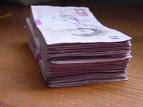The Great Britain pound posted the fourth straight weekly decline against the US dollar and the Japanese yen as the fundamental data signaled that the nation’s economy is stagnating, prompting the speculation the UK central bank will be required to embark on a quantitative easing.
There was enough data this week to support the negative outlook for the future of Britain’s economy. The RICS UK Housing Market Survey showed 23 percent more surveyors recorded falling rather than rising prices in August, while the house price index of the Department for Communities and Local Government dropped 1.5 percent in July. The retail sales shrank 0.2 percent in August, according to the government report. The economy continues to feel the inflationary pressure as the inflation increased to 4.5 percent in August from 4.4 percent in the month before.
Chancellor of the Exchequer George Osborne and Deputy Prime Minister Nick Clegg spoke about the possibility of increasing the monetary stimulus to support Britainâs economy. Bank of England policy maker Adam Posen said the central bank should purchase as much as £100 billion in securities over the next three months. Analysts think that the BoE may expand their asset purchase program, the policy known as a quantitative easing, as early as November. Currently the program worth £200 billion.
GBP/USD fell from 1.5831 to 1.5786 during this week. GBP/JPY slipped from 122.62 to 121.19 and EUR/GBP rose from 0.8579 to 0.8740 over the week.
If you have any questions, comments or opinions regarding the Great Britain Pound,
feel free to post them using the commentary form below.
